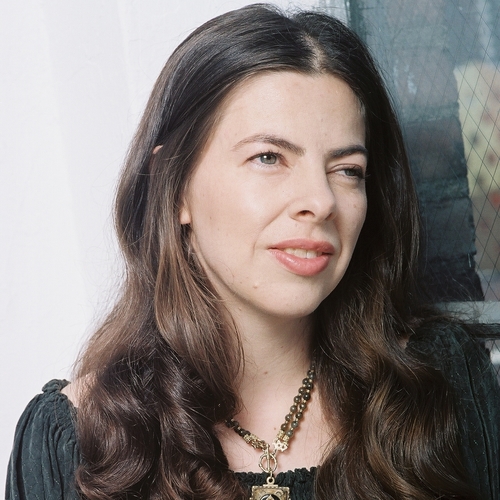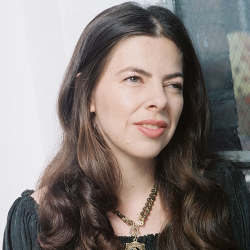Rabbi Jill Hammer

Kohenet is a training program in spiritual leadership for women on a Jewish path. The Kohenet Hebrew Priestess Institute trains its kohanot to create a Jewish ritual experience inclusive of women’s history and experience, embodied and earth-based in its approach, and innovative in its language about God/dess, people and the world. Kohenet is a movement, a sisterhood, and a network of communities celebrating the sacred in the body, the earth, and the cosmos, and holding the world to be an embodiment of Shekhinah— divine presence. The work of the Kohenet Institute applies to all of the four proposals Sid Schwarz makes in his essay “The Changing Face of Jewish Identity in America.”
First, Kohenet has a unique approach to kedusha, holiness. Kohenet asks its students and alums to live lives dedicated to the Divine Presence embodied in the world around them. Our ritual culture assumes the nearness and the embodied nature of the sacred at all times. When one of our community members has an important life moment– a new name, a fertility journey, an illness, the death of a relative, an entry into aging, etc.—the community creates ritual around that life moment. We come together for new moons, holidays, and Shabbat with a sense of reverence, both at our retreats and in local gatherings. We use drumming, dancing, and music to heighten the ecstatic quality of our prayers. The Hebrew and English language of our prayers asserts the sacredness of all beings, all genders, and the whole cosmos.
We have a central altar in every prayer, learning, and community gathering space, recalling the sacred spaces of our Israelite ancestors. This sacred space, which embodies the kedusha of the community and the world, adds a dimension of holiness to all that we do. We also engage in a material culture of holiness in the tradition of our ancestors by creating sacred objects from amulets to incantation bowls to tallitot to as part of our work. Our students, when they graduate, bring this Kohenet culture, which is a re-enlivening of forgotten Jewish traditions as well as an integration of long-standing Jewish rites and contemporary practices, to their communities. The core Jewish value that guides our work is a sense of the immanent divine presence, as the tradition says: “the whole earth is full of the divine glory.” Every practice we teach is meant to inculcate a sense of living sacred presence at every moment.
The Kohenet Institute also provides a new kind of sacred community, kehillah. We call our school a sisterhood and a movement as well as a training program. Our students, who live throughout North America as well as in places like England and Australia, support one another’s work on-line, visit one another in their home cities, and gather as local groups. They hold shiva Zoom calls for one another and healing calls on the phone. As alums, they continue to gather once a year for learning and celebration. No matter when our students graduate, they remain part of a living network. And, our network extends beyond our students and graduates to the programs and communities they found: on-line Jewish prayer sessions, interfaith ritual circles, Jewish social activism organizations, and much more.
The Kohenet Institute provides an innovative way of studying Torah. In fact, we study chochma, wisdom, as part of our curriculum, looking at Lady Wisdom in Proverbs 8 and trying to understand why our ancestors gave the figure of Wisdom a female face. Whenever we present Torah, we integrate questions about gender, the sacred feminine, and the earth. We expand Torah to include material from Jews and Israelites often considered marginal. Our sources range from women’s oral healing traditions to kabbalistic works, from biblical and talmudic-era archaeology to Yiddish and Ladino prayers. We teach Mishnah on the topic of vegetables, the seasons, magic, midwifery, and women’s clothing. We are committed to a counter-oppressive Torah, and when we read Torah, we highlight its messages of liberation and its hints about the lives of the marginalized, as well as its expressions of deep presence with the Source of Life. We do not feel shy about critiquing the Torah, and, we also celebrate it for its role in our ancestors’ lives. Our students, many of whom felt excluded by Torah study as it generally happens in the Jewish community, feel excited and enlivened by Torah study at Kohenet.
At Kohenet, we also provide avenues of connection to tzedek, social justice. The Kohenet Institute self-defines as a pluralistic community, and so we do not dictate to our students what their causes should be. Our students and alums do a wide variety of kinds of activism as their own hearts dictate. They work on anti-sexism, anti-racism, healing the environment, solving the Israeli-Palestinian conflict, and other issues of concern. They use their ritual skills to create more powerful activism, as when one of our students became the director of the Climate Ribbon project, an art and ritual installation to draw attention to the ill effects of global warning, or another student created powerful haftarot for occasions like Martin Luther King Day and International Women’s Day.
A fifth sacred value that guides our community might be called arigah or being woven with the earth, the cosmos, the Divine, and one other. At Kohenet, we are trying to create a Judaism that is sustainable at its core, and motivated by a sense of respect and responsibility for the earth, and a resonance with the more-than-human world. In our prayer, study, ritual, and social action, we always include the earth as a presence in our lives, worthy of care and reverence. We support the belief that all of us, all traditions and all beings, should be guided by a sense of the uniqueness of each individual being manifesting God’s image, and a belief that each of us is called to do transformative work in the world.
____________________
Rabbi Jill Hammer is the Director of Spiritual Education at the Academy for Jewish Religion, a pluralistic rabbinical and cantorial seminary in Yonkers, NY. At AJR, she specializes in ancient and contemporary midrash, mysticism, ritual, and contemporary spirituality. Rabbi Hammer is also the co-founder of the Kohenet Hebrew Priestess Institute, a program in spiritual leadership for Jewish women. As a leader of the Kohenet Institute, she creates and teaches earth-based, embodied ritual and study that transforms Jewish conceptions of prayer and ceremony. Rabbi Hammer is the author of five books: Sisters at Sinai: New Tales of Biblical Women (2001), The Jewish Book of Days: A Companion for All Season (2006), The Omer Calendar of Biblical Women (2012), The Hebrew Priestess: Ancient and New Visions of Jewish Women’s Spiritual Leadership (2014), Undertorah: An Earth Based Kabbalah of Dreams (2022).


